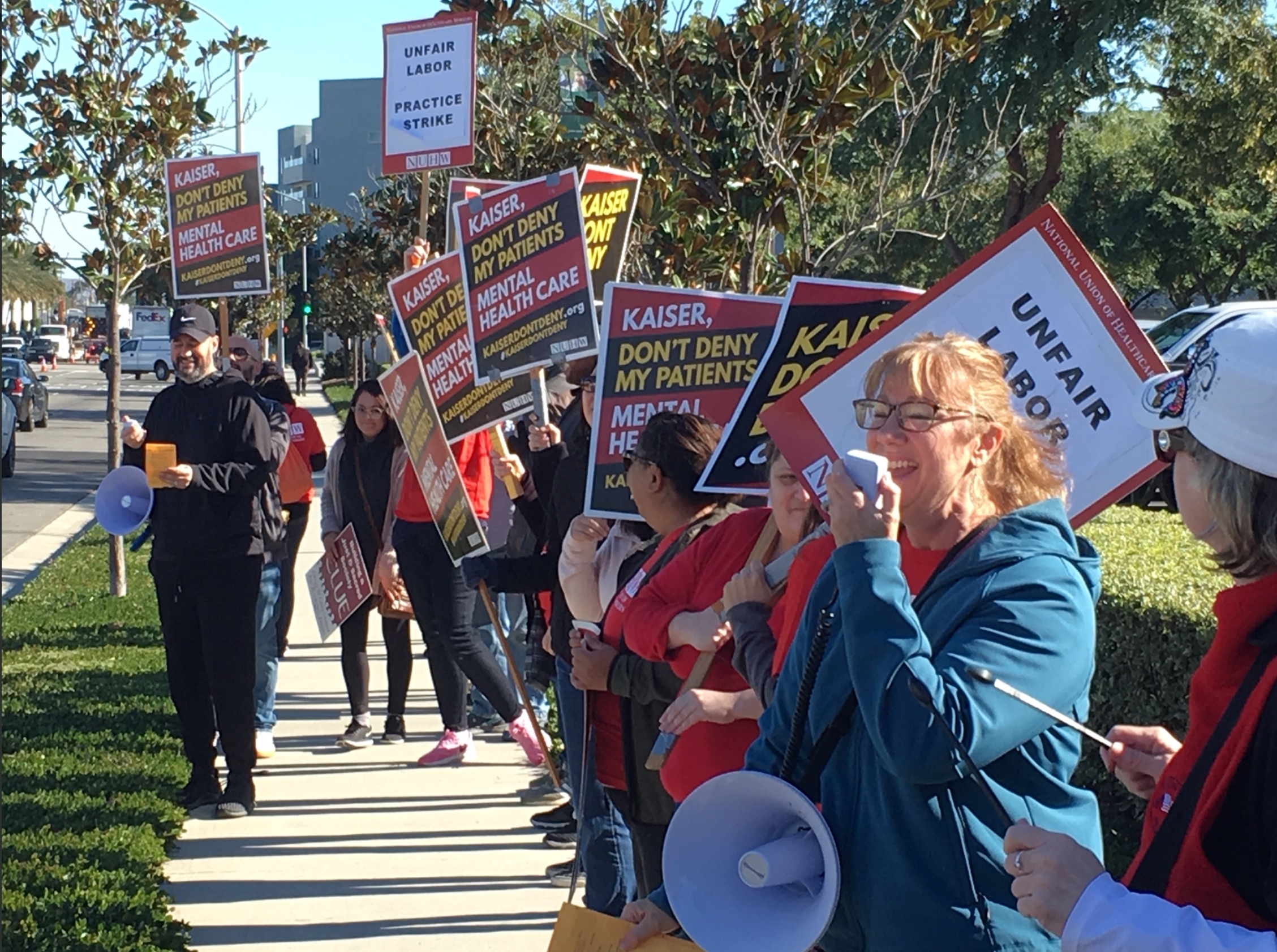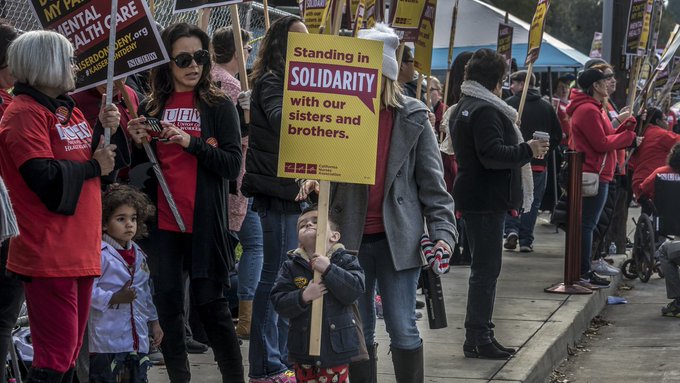
Hollywood Sign (Photo: Evan Symon for California Globe)
Three Huge Strikes Impact California: Kaiser Permanente, SAG-AFTRA, WGA
‘This has been a wild year for strikes’
By Evan Symon, October 5, 2023 12:31 pm
Two major strikes involving the healthcare industry and the entertainment industry continued on Thursday, with both the Screen Actors Guild-American Federation of Television (SAG-AFTRA) and Kaiser Permanente workers both currently negotiating to end the strikes as soon as possible.
While the SAG-AFTRA strike continues mainly in Southern California and the nationwide UAW strike currently only affecting two distribution plants in the Inland Empire, the now two-day long Kaiser Permanente strike has affected the entire state.
The Kaiser strike began on Wednesday, with 75,000 employees striking nationwide for the largest healthcare strike in U.S. history. While the strike currently extends to only five states and the District of Columbia, the lion’s share of strikers are in California, the home state of Oakland-based Kaiser Permanente. Unlike the Hollywood and UAW strikes, Kaiser Permanente has been actively negotiating with their workers since day one, with the current strike only being a three-day one as to show seriousness on the workers part.
While higher worker pay is one demand, the others have come directly from the COVID-19 pandemic. Specifically, Chronic understaffing at Kaiser Permanente facilities and worker burnout rates are major issues, with workers demanding that more people be hired to help keep with demand and adequate patient care. Kaiser has countered with several tentative agreements, including across the board raises over the next four years, a California worker minimum wage of $23 an hour, and benefit enhancements. Despite these and other continued negotiations, worker representatives have maintained that Kaiser has not negotiated in good faith.
“They are not bargaining in good faith,” said Linda Hunter, a member of the bargaining team, in a statement on Thursday. “We are pushing for good faith bargaining. We are just stressing the point of safety, patient care. A patient crisis we are in now because of short staffing. And we are asking that they fix that and that they fix it immediately.”
The Coalition of Kaiser Permanente Unions added, “At issue, healthcare workers say, are a series of unfair labor practices related to bargaining in bad faith, along with simmering staff concerns related to unsafe staffing levels that can lead to dangerously long wait times, mistaken diagnosis, and neglect. After years of the COVID pandemic and chronic understaffing, Kaiser healthcare workers are calling on management to provide safe staffing levels.”
For the rest of the week, Kaiser Permanente locations across the state will either be closed or be under reduced hours. Should a deal not be reached by Friday, workers representatives have said that a two-week strike will be voted on, likely leading to some more longer-term closures.
“Hospital workers, along with first responders and teachers, are usually the most hesitant to strike because they know that their strike will lead to people potentially getting harmed and the public being less sympathetic towards them as a result,” said Theresa Stevenson, an arbitrator in Michigan who has helped settled union disputes and strikes in the past. “The Kaiser Permanente strike is no different. They’re doing the usual playbook for these kinds of strikes. They start off with an initial few days. They show they are serious and warn it could be worse if they have to have a longer strike.”
“Recently a favorite has been a three day strike, like with what we saw earlier this year from the LA school workers strike. With the Hollywood strikes, you know, those unions have the industry lock, stock, and barrel, so a full union strike for no set of days makes sense. The UAW strike right now, same idea, although that one isn’t nearly as strong. Automakers just need to sit tight for a few more weeks, sweat it out, and wait for the strike pay to run out. Shawn Fain isn’t exactly the best person to lead them.”
“For Kaiser though, they’re using escalation. This has been a wild year for strikes, and these three will likely end the year on them barring some major new strike coming up.”
SAG-AFTRA
The SAG-AFTRA strike, which started on July 14th and has currently lasted 83 days, has been at a standstill with the Alliance of Motion Picture and Television Producers (AMPTP) for months. Negotiations over better residual fees for streaming service programs, overall better pay, and strict regulation on the use of artificial intelligence have been slow to progress, mirroring the first several months of the largely concurrent WGA strike.
While the WGA strike ended last month, SAG-AFTRA has continued, in large part due to Hollywood studios being preoccupied with negotiations with the WGA until late September. In fact, Alliance of Motion Picture and Television Producers (AMPTP) representatives immediately reached out to SAG-AFTRA right after the negotiations with the WGA ended, leading to the beginning of talks earlier this week. The talks proved to be positive, and after a short break from both sides, talks are set to resume on Friday.
“We have concluded today’s bargaining with the AMPTP and will resume talks on Friday, October 6,” said the union in a tweet on Wednesday. “The parties will be working internally over the weekend, resuming Monday, Oct. 9. Please continue to come out to picket lines or other strike activities in your local.”
We have concluded today’s bargaining with the AMPTP and will resume talks on Friday, October 6. The parties will be working internally over the weekend, resuming Monday, Oct. 9.
Please continue to come out to picket lines or other strike activities in your local. pic.twitter.com/U2MSCE4rqK
— SAG-AFTRA (@sagaftra) October 5, 2023
“Neither the actors nor the studios want a long strike like the WGA pulled,” said Jason, a SAG-AFTRA member who has helped keep many members in lower income levels on the picket lines for the last several months, to the Globe. “We stood by the WGA, but they were asking for some next level things and managed to get a lot of what they wanted. We just want some basic pay and work protections, and we have been more willing to talk, so things seem to be going much smoother. It took a few months for the negotiations to really get going, but we are here now.”
Talks on both the SAG-AFTRA and Kaiser Permanente strikes are expected to continue with their respective industries in the coming days.





The visual optics aren’t favoring those on strike.
In Hollywood, millionaire actors, such as Kevin Bacon and Susan Sarandon, are striking for more money.
At the hospitals, the picket lines are formed of great big fat people. I’m not talking about a few pounds overweight, these people are packing an extra hundred pounds apiece. I don’t know about you, but MY doctor is always telling me to watch what I eat, and I’m pretty thin (5’7″. light welterweight) I don’t understand how one can be both over-fed and under-paid, or why so many great big fat people are even employed in the medical field.